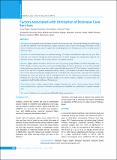Please use this identifier to cite or link to this item:
https://hdl.handle.net/20.500.14356/2295| Title: | Factors Associated with Utilization of Postnatal Care Services |
| Authors: | Thapa, Suraj Choudhary, Pradeep Adhikari, Rita Thapa, Kanchan |
| Citation: | ThapaS., ChoudharyP., AdhikariR., & ThapaK. (2023). Factors Associated with Utilization of Postnatal Care Services. Journal of Nepal Health Research Council, 20(4), 886-892. https://doi.org/10.33314/jnhrc.v20i4.4236 |
| Issue Date: | 2022 |
| Publisher: | Government of Nepal; Nepal Health Research Council; Ramshah Path, Kathmandu, Nepal |
| Keywords: | Health services Maternal and child health Nepal Postnatal care |
| Series/Report no.: | Oct-Dec, 2022;4236 |
| Abstract: | Abstract Background: Preventable causes of death accounts for 810 women per day. Care provided during the child-bearing and after the childbirth is of vital importance. Despite of the facts, many women in developing world deprive of this service. Therefore, this study aims to explore the contributing factors for Postnatal care service in urban areas of Chitwan, Nepal. Methods: A cross-sectional study was conducted among 212 mothers who delivered within last one year. Data collection was conducted through pre-tested questionnaire in Nepali language after taking ethical approval and informed consent. Descriptive and bi-variate statistics were applied in analysis. Results: Higher number of mothers (39.2%) were in 25-29 years age groups. Hindu were 89.6% and Janajati were 70.7%. Mothers (26.4%) reported to reach nearest health facilities on foot by 30 minutes or more. Nearest health facility had twenty-four hours seven days a week maternal health services for 57.5% of mothers. Antenatal visitors were 83.9% and 96.7% reported institutional delivery. About 27.8% mothers were aware about Postnatal care; 48.1% were aware about maternal complications; 98.1% mothers had at least one PNC visit; and 34.4% reported Postnatal care visit as per protocol. Lack of counseling (52.6%) was one of the main reasons for not completing Postnatal care. Age factor, husband’s education, health service-related variables, availability of essential drugs and equipment in health facilities influenced Postnatal care. Conclusions: Fewer mothers reported about complete Postnatal care service. Socio-economic factors, health service-related factors, experience of mothers on their previous childbirth also contributed to complete Postnatal care. Keywords: Health services; maternal and child health; Nepal; postnatal care |
| Description: | Original Article |
| URI: | https://hdl.handle.net/20.500.14356/2295 |
| ISSN: | Print ISSN: 1727-5482; Online ISSN: 1999-6217 |
| Appears in Collections: | Vol 20 No 04 Issue 57 Oct-Dec, 2022 |
Files in This Item:
| File | Description | Size | Format | |
|---|---|---|---|---|
| 4236-Manuscript-32166-1-10-20230720.pdf | Fulltext. | 216.48 kB | Adobe PDF |  View/Open |
Items in DSpace are protected by copyright, with all rights reserved, unless otherwise indicated.
